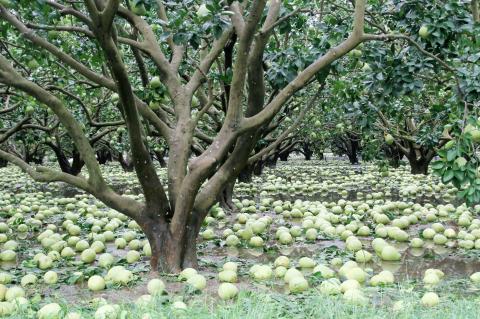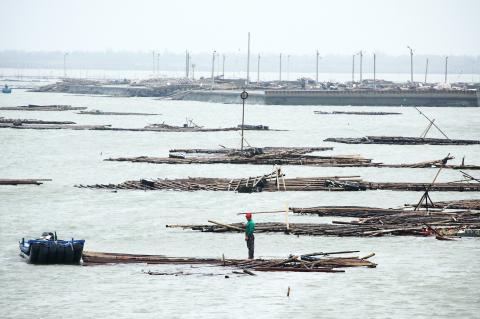The estimate of the nation’s agricultural losses caused by Typhoon Soudelor had risen to NT$600 million (US$18.9 million) as of 6pm yesterday, with Hualien County the hardest hit, the Council of Agriculture said yesterday.
Agricultural losses in Hualien were estimated at NT$134 million, followed by Tainan at NT$124 million, Kaohsiung at NT$79.1 million, Taoyuan at NT$47 million and Pingtung County at NT$44 million.
The estimate of the damage caused by the typhoon is likely to continue to increase in coming days, the council said.

Photo: CNA
Bananas were the hardest-hit crop, suffering losses of NT$125 million, with pomeloes, taros, bamboo shoots and Chinese leeks, also known as kow choi (jiucai, 韭菜), also affected by the storm.
Output from Changhua County’s Sijhou Township (溪州), considered the nation’s largest guava producing area, is not expected to resume for at least three to four months, according to local farmers.
Prior to Soudelor making landfall, the Changhua area was buffeted by foehn winds for an entire night, causing pollinated flowers and immature fruit in more than 500 hectares of guava farms to be “roasted,” local farmer Chang Lung-tan (張龍潭) said, adding that after Soudelor turned southward, the winds whipped the dried fruit and flowers from the trees.

Photo: Lin I-chang, Taipei Times
The majority of Tainan’s agricultural losses were pomeloes, the Tainan City Government said.
Tainan Mayor William Lai (賴清德) visited Madou (麻豆) to assess the damage, promising to appeal on the farmers’ behalf for council subsidies according to the Agricultural Natural Disaster Relief Regulations (農業天然災害救助辦法), adding that he would also ask if the army is willing to provide personnel to help farmers more quickly clear out their orchards.
Yunlin County Legislator Chang Chia-chun (張嘉郡) visited the county’s affected areas and received complaints from “new farmers” that their greenhouses, which many had built for NT$3 million on bank loans of NT$2 million, were damaged.
Chang said that she has asked the Agriculture and Food Agency to schedule inspections of damage caused by the typhoon, and that she would also ask the central government to fund exclusive subsidies for these farmers.
The council yesterday estimated that livestock, aquaculture and forestry losses, as well as losses suffered by animal husbandry operations, totaled NT$84.7 million.
Strong winds along the Chiayi County coast devastated the region’s prized oyster and clam farms, which suffered losses that might be the most severe in two decades.
The Dongshih (東石) and Pudai (布袋) townships together produce an estimated 9,500 tonnes of oysters and clams per year in an industry valued at NT$2.15 billion, oyster farmer Tsai Mao-chi (蔡茂記) said.
Preliminary estimates place losses at nearly NT$100 million, Tsai said, adding that oyster and clam production will be halved in the second half of the year and the losses will also directly affect resellers and restaurants.
The industry will take more than half a year, maybe even up until March next year, to recover from its losses, Tsai said.
Chiayi official Lee Chien-lin (李建霖) said that between 8,000 and 9,000 floating oyster farms were damaged by the storm, but the local fisheries association still needs to determine the exact figure.
One oyster farmer, surnamed Chen (陳), said that his losses from Soudelor were worse than from Typhoon Morakot, as he lost 90 oyster farms, each costing NT$60,000 in overheads. Along with losses from oysters swept out to sea, Chen said he has lost more than NT$6 million.
Additional reporting by Liu Wan-chun and Yen Hung-chun

Taiwanese can file complaints with the Tourism Administration to report travel agencies if their activities caused termination of a person’s citizenship, Mainland Affairs Council Minister Chiu Chui-cheng (邱垂正) said yesterday, after a podcaster highlighted a case in which a person’s citizenship was canceled for receiving a single-use Chinese passport to enter Russia. The council is aware of incidents in which people who signed up through Chinese travel agencies for tours of Russia were told they could obtain Russian visas and fast-track border clearance, Chiu told reporters on the sidelines of an event in Taipei. However, the travel agencies actually applied

Japanese footwear brand Onitsuka Tiger today issued a public apology and said it has suspended an employee amid allegations that the staff member discriminated against a Vietnamese customer at its Taipei 101 store. Posting on the social media platform Threads yesterday, a user said that an employee at the store said that “those shoes are very expensive” when her friend, who is a migrant worker from Vietnam, asked for assistance. The employee then ignored her until she asked again, to which she replied: "We don't have a size 37." The post had amassed nearly 26,000 likes and 916 comments as of this

New measures aimed at making Taiwan more attractive to foreign professionals came into effect this month, the National Development Council said yesterday. Among the changes, international students at Taiwanese universities would be able to work in Taiwan without a work permit in the two years after they graduate, explainer materials provided by the council said. In addition, foreign nationals who graduated from one of the world’s top 200 universities within the past five years can also apply for a two-year open work permit. Previously, those graduates would have needed to apply for a work permit using point-based criteria or have a Taiwanese company

The Shilin District Prosecutors’ Office yesterday indicted two Taiwanese and issued a wanted notice for Pete Liu (劉作虎), founder of Shenzhen-based smartphone manufacturer OnePlus Technology Co (萬普拉斯科技), for allegedly contravening the Act Governing Relations Between the People of the Taiwan Area and the Mainland Area (臺灣地區與大陸地區人民關係條例) by poaching 70 engineers in Taiwan. Liu allegedly traveled to Taiwan at the end of 2014 and met with a Taiwanese man surnamed Lin (林) to discuss establishing a mobile software research and development (R&D) team in Taiwan, prosecutors said. Without approval from the government, Lin, following Liu’s instructions, recruited more than 70 software